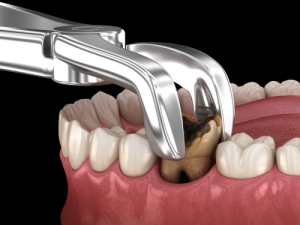Tooth Extraction: What is Involved and What Does it Cost?
Are you dreading the dentist every time you have to get a tooth extraction done? If so, it might be worth considering tooth extraction as an option. The process is pain-free for the patient and can be an affordable and convenient solution for many dental problems. In this blog post, we will go over what is involved in tooth extraction, the reasons for extraction, the types, and what to expect during treatment. We will also cover the cost of extraction and how long it takes to recover from the procedure. Finally, we’ll provide tips on making tooth extraction as pain-free as possible for you and your dentist!
What is involved in a tooth extraction?
 Tooth extraction is a process that involves removing a tooth from the jawbone. Two types of anesthesia can be used during the extraction – local anesthesia, which numbs the surrounding area, and general anesthesia, which blocks the pain receptors. The cost of tooth extraction will vary based on the type of anesthesia chosen, the complexity of the procedure involved, and the patient’s health status. Therefore, when deciding to have a tooth extraction, it is essential to consult a dentist to get an accurate estimate of the cost and the expected healing process.
Tooth extraction is a process that involves removing a tooth from the jawbone. Two types of anesthesia can be used during the extraction – local anesthesia, which numbs the surrounding area, and general anesthesia, which blocks the pain receptors. The cost of tooth extraction will vary based on the type of anesthesia chosen, the complexity of the procedure involved, and the patient’s health status. Therefore, when deciding to have a tooth extraction, it is essential to consult a dentist to get an accurate estimate of the cost and the expected healing process.
What are the reasons for tooth extraction?
Tooth extraction is the most common dental procedure, and it is often necessary due to tooth decay, gum disease, or a severe infection. The cost of tooth extraction can vary depending on the reason for removal and whether you have any other medical conditions. There are several types of extractions – abrasive, immersional/periapical/surgical debridement, mini-incision sedation (MIS), complete denture restoration (CDR), endodontic therapy, oral surgery…and more! It’s essential to choose an operative specialist who can perform your procedure safely and effectively so that you don’t experience any pain or discomfort after the operation is completed. So, what are you waiting for? Book an appointment with the dental professionals today and get started on the road to healthy teeth and gums from dental implants fort worth!
Types of tooth extraction:
It’s never easy to say goodbye to teeth, but it’s even more complicated when toothache kicks in. If pain is the only discomfort you’re experiencing, you can opt for a general extraction. This is the most common type of extraction and can be done under local anesthetic/opioid prescription or with no anesthesia at all (called a “cauterization”). However, an extraction under general anesthesia is the best option if you’re experiencing severe pain or the tooth is in an awkward position. Local extraction (where the tooth is removed from the gum and socket) is also an option, and it’s usually done with a local anesthetic. Sedation-based procedures include:
- IV sedation.
- Regional blocks (layers of drugs injected into specific areas).
- Neuromuscular blocking agents (used to paralyze nerves before surgery).
Regardless of the extraction type, you’ll likely have to revisit the dentist in a few weeks for a check-up and oral surgeon consultation.
What to expect during treatment:

Woman visiting her dentist
If you’re ever considering tooth extraction, speak to your dentist first. The extraction process generally takes around 10 minutes, and you’ll likely feel pain during the procedure. However, it should dissipate pretty quickly after the extraction is complete. You may also experience some blood in your mouth following the extraction, but this will eventually disappear on its own. Most people report no lasting discomfort or issues following their tooth extraction appointment! So, if you’re ever feeling nervous or anxious about the extraction process, speak to your dentist and get all the information you need. You won’t regret it!
Cost of tooth extraction:
Tooth extraction can be expensive and unpleasant, but it needs to be done from time to time. The cost of extraction depends on various factors, including the type of tooth extraction and the tooth’s location. Primary tooth extraction is usually cheaper than secondary tooth extraction, and insurance may cover some or all of the costs. It’s essential to consult with your insurance company before scheduling any oral surgery, as they will be able to provide you with a ballpark estimate for the costs involved. Additionally, many factors affect the price of oral surgery, and it’s best to consult with an oral surgeon ahead of time to get an idea of the costs involved in your specific case. Good oral health starts with proper tooth extraction, so make sure to consult a dentist when the time is right!
How painful is a tooth extraction?
Tooth extraction can be a painless or excruciating procedure, depending on the type of extraction you have. The entire process usually takes around an hour, and the pain diminishes over time. There are many different types of extraction available, so you can choose the one that is most comfortable for you. Most people generally pay around $200 for an essential extraction without complications or additional treatments. It’s important to be aware of each extraction type’s risks and benefits before deciding. Make an appointment with your dentist and get all the information you need about tooth extraction to make an informed choice.
How long does it take to recover from the extracted tooth?
 Teeth extraction is a necessary medical procedure that can be life-saving. It’s essential to understand what is involved and the associated costs to make an informed decision about whether or not to undergo surgery. Generally, patients should expect to feel some pain and tenderness in the area around the tooth for up to a week following the surgery. Oral hygiene is critical after a tooth extraction, as improper brushing and flossing can lead to infection. In most cases, patients can resume their normal activities within two days of an extraction procedure. If you have any questions or concerns about tooth extraction, don’t hesitate to consult with your dentist.
Teeth extraction is a necessary medical procedure that can be life-saving. It’s essential to understand what is involved and the associated costs to make an informed decision about whether or not to undergo surgery. Generally, patients should expect to feel some pain and tenderness in the area around the tooth for up to a week following the surgery. Oral hygiene is critical after a tooth extraction, as improper brushing and flossing can lead to infection. In most cases, patients can resume their normal activities within two days of an extraction procedure. If you have any questions or concerns about tooth extraction, don’t hesitate to consult with your dentist.
Book Your Appointment Now
Tooth extraction is an often-needed procedure that can be done at home or in a dentist’s office. As with all dental procedures, a range of fees and services are available depending on the location, type of tooth being extracted, and the number of teeth involved. In addition to the cost of the extraction itself, you may also need to budget for pain relief medications, follow-up appointments, and possible travel to the dentist’s office. So, whether you’re looking to book an appointment or learn more about the process, book your appointment and get ready for easy and pain-free extraction!
Frequently Asked Questions
What happens to your body after a tooth extraction?
After tooth extraction, your body goes into shock and can feel like you’re experiencing a heart attack. Most of the time, people wake up in the hospital with general anesthesia still active in their system. This anesthesia is meant to numb the tooth-extracted area, and it will wear off within 1 to 2 hours. You will then be given a general anesthetic and remain unconscious for about six hours. When you wake up, you may experience pain around the extraction site and swelling above or below your lip, depending on how deep the tooth was pulled out.
What should you not do after a tooth extraction?
Following a tooth extraction, it is essential to avoid eating or drinking as this can result in an infection. In addition, smoking, chewing tobacco, and drinking alcohol are all wrong for your teeth and mouth and should be avoided post-op. Finally, if you experience pain or discomfort in the area around your teeth, don’t hesitate to call for medical assistance.
How long does it take to recover from the extracted tooth?
The average time it takes to recover from extraction is around six to eight weeks. At first, you may experience pain and swelling in the affected area, as well as headaches and fatigue. Make sure you rest properly, drink lots of fluids, and apply soothing ointments to the site. Then, gradually return to your normal activities as tolerated.
How painful is a tooth extraction?
Tooth extraction can be quite painful, depending on the area and severity of the toothache. However, needless to say, the pain varies from person to person and largely depends on the procedure being carried out. Extraction procedures such as teeth removal are among the most common surgeries people undergo. The extraction costs will also largely depend on location, time taken for surgery, number of teeth extracted, etc.
What is the average cost for a basic tooth extraction procedure?
The average cost for a basic tooth extraction procedure typically falls between $250 and $500, depending on the location and dentist. In most cases, you’ll need to go through a general anesthetic or local anesthetic to have the tooth extracted. The most common procedure is “simple extraction,” wherein the dentist removes only one tooth at a time without damaging adjacent teeth or gums.
Conclusion
Tooth extraction is a process that involves the removal of teeth by a dentist. In addition, different types of extraction procedures involve the use of other tools and techniques. This article provides an overview of the steps and costs associated with tooth extraction. If you’re considering tooth extraction, speak to a dentist to get an accurate estimate of the cost and procedure involved. In the meantime, feel free to read through the rest of the article to learn more about the pain and recovery process.


